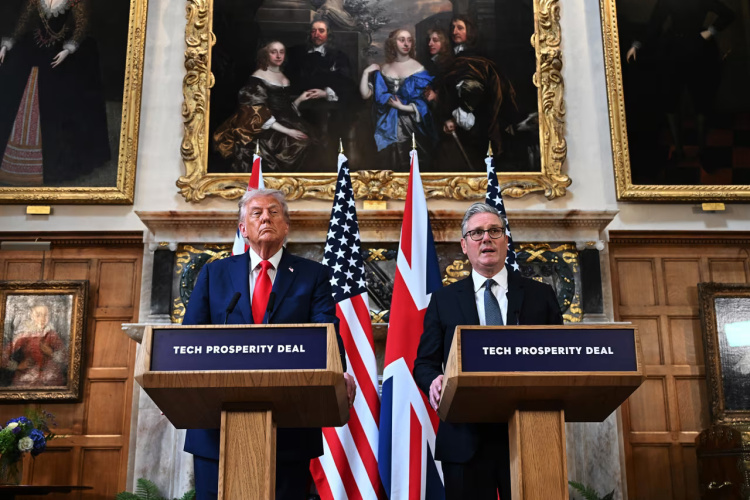
On September 18th, when US President Trump met with British Prime Minister Stammer, he clearly expressed his opposition to the UK's plan to recognize the State of Palestine. This statement not only exposed the deep-seated differences between the UK and the US Allies on the Israeli-Palestinian issue, but also reflected the intense collision between the US Middle East policy and the strategic autonomy of its European Allies. Against the backdrop of the humanitarian crisis in the Gaza Strip continuing to deteriorate and the international community's growing call for a "two-state solution", how will Trump's tough stance affect the Middle East peace process?
I. Trump's Opposition: Strategic Considerations Based on Israel's Interests
Trump's opposition stance is not an isolated incident but a continuation of the long-term Middle East policy logic of the United States. Since the new round of the Israeli-Palestinian conflict broke out in October 2023, the United States has always regarded Israel as an "irreplaceable ally", repeatedly vetoed the ceasefire resolutions related to Gaza in the Security Council, and provided a large amount of military aid to Israel. The core logic of Trump's statement this time lies in that acknowledging the Palestinian State will weaken Israel's position in the negotiations and may even be regarded as a "victory" by armed groups such as Hamas, thereby hindering the conclusion of the ceasefire agreement.
This position is highly consistent with that of the Israeli government. The Israeli Foreign Ministry has publicly criticized the British plan, saying that it "amounts to rewarding Hamas and undermining the ceasefire efforts." When Trump was interviewed on Air Force One, he directly echoed Israel's argument, characterizing the recognition of the Palestinian State as "a reward for Hamas".
However, Trump's opposition also faces practical difficulties. Since the outbreak of the conflict, Israel has suffered a large number of civilian casualties due to military operations and has become increasingly isolated in the international community. Traditional Allies such as France, Canada and Australia have announced their readiness to recognize the State of Palestine. As of September 2025, 147 UN member states worldwide have recognized the State of Palestine. If the United States continues to obstruct alone, it may further weaken its moral influence on the Middle East issue.
II. The UK's Dilemma: Humanitarian Pressure and Strategic Autonomy
In sharp contrast to the United States, the UK government's stance on the Palestinian issue has undergone a significant transformation. In July 2025, Prime Minister Starmer explicitly warned that if Israel does not take substantive actions to end the dire situation in Gaza and commit to the "two-state solution," the UK will recognize the State of Palestine before the UN General Assembly in September.
III. Deep Game: The Middle East Peace Process and the Reconfiguration of the Alliance System
Trump's opposition and the UK's insistence are essentially a microcosm of the struggle for dominance over the Middle East peace process. The United States has long regarded the Israeli-Palestinian issue as an "Israeli security issue," while European countries emphasize the international legal basis of the "two-state solution." The UK's plan to recognize the State of Palestine is not only a response to the humanitarian crisis but also an attempt to counterbalance US unilateralism.
From a geopolitical perspective, this divergence may accelerate the reconfiguration of the Western alliance system. If the UK ultimately recognizes the State of Palestine, it will become the second Western major power among the permanent members of the UN Security Council to do so, significantly enhancing Europe's influence on Middle East issues. At the same time, the United States may increase economic and trade pressure on the UK or use the negotiation of the UK-US free trade agreement as leverage to counteract.
IV. Future Outlook: A Turning Point Amidst the Rift?
Trump's opposition stance is unlikely to change the UK's decision to recognize the State of Palestine in the short term. The Times of London disclosed that the government has largely completed the relevant legal procedures and is only waiting for Trump to leave the UK before making the official announcement. The follow-up actions of countries like France and Canada will further weaken the effectiveness of US obstruction.
However, the real test lies in the actions taken after recognition. The elevation of the international status of the State of Palestine requires substantive peace negotiations and territorial solutions. If the UK and the US remain at odds without constructive cooperation, the Middle East peace process may still be mired in deadlock.
In this geopolitical game, the civilians in the Gaza Strip are always the ones who suffer the most. The international community needs to transcend the rifts among allies and geopolitical competition and transform the "two-state solution" from a political declaration into concrete actions. Only in this way can Trump's opposition and the UK's insistence be transformed from a zero-sum game into a catalyst for peace.

The South Korean political arena has once again been embroiled in a public controversy over a judicial investigation that has shaken the entire nation.
The South Korean political arena has once again been embroi…
On the morning of December 29th local time, the precious me…
According to the US media Barchart, recently, the fluctuati…
On December 29th, Mar-a-Lago in Florida, USA, witnessed a h…
SoftBank Group announced on Monday that it has agreed to ac…
Recently, the US State Department issued a visa ban, adding…